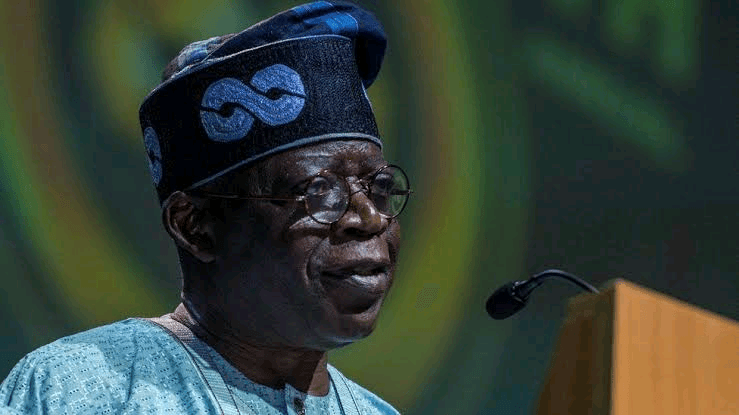By Abba Dukawa
President Bola Ahmed Tinubu’s last week Monday media chat has sparked intense debate among Nigerians. Even before the interview was aired Nigerians lost interest in listening it.for those watches it argued the chat was pre-recorded and carefully edited, which have prevented tough questions from being asked.
Some question the choice of media outlets, suggesting that the president should have engaged with a broader range of journalists to ensure a more representative and challenging discussion. While Other segments of people point out that the chat demonstrated his confidence and commitment to the country’s development.
On the other hand, supporters argue that the chat was a positive step towards transparency and accountability, and others view it as a demonstration of his leadership and commitment to the country’s future.
In nutshell, opinions on the media chat reflect the deep divisions within Nigerian society. While some see it as a sign of the president’s insensitivity to the suffering of the citizens but the president’s emphasized his confidence and vision for the country for driving progress.
Let’s begin with the pressing issue of insecurity plaguing parts of the country. Security experts have identified several underlying causes of insecurity in Nigeria, which significantly impede the nation’s socio-economic progress and development.
To grasp the severity of insecurity in certain geopolitical zones, considering Nigeria’s struggles with unprecedented security challenges. Despite the technical defeat of Boko Haram Terrorists (BHTs), the group continues to launch attacks.
Furthermore, banditry and kidnapping for ransom have reached alarming levels, with affected communities at the mercy of armed gangs that roam freely, wreaking havoc. For Mr President genuinely understand Nigeria’s security situation, President Tinubu must move beyond the fabricated statistics provided by his officials.
A firsthand experience, such as traveling from Abuja to Lagos by road, visiting local markets, or taking a stroll through any Nigerian city, will allow him to accurately assess and appreciate the reality on the ground.
According to the National Bureau of Statistics’ latest Crime Experience and Security Perception Survey report, Nigerians paid a staggering N2.3 trillion in ransom to kidnappers within in 2024. The amount surpasses the N1.647 trillion allocated for national defense in the 2024 budget and exceeds the combined 2024 budgets of several states, including Ekiti, Gombe, Yobe, Kogi, and Ondo, totaling N1.69 trillion.
On government borrowing: Within 18 months in power the administration has taken several foreign loans, totaling approximately $9.87 billion. World Bank Loans*: $1.95 billion was secured in the first four months of his administration.
Additionally, a $1.5 billion World Bank loan was reported.External Loan*: The Senate approved a ₦1.77 trillion ($2.2 billion) external loan request to finance Nigeria’s 2024 budget deficit and Other Loans*: $4.1 billion was borrowed, including $700 million for education, $750 million for power, and $500 million for women empowerment.
The government’s reckless borrowing spree is a stark demonstration of leaders insensitivity to the plight of citizens. Nigeria’s economy will continue to struggle unless the government adopts a more sustainable approach to harnessing the country’s vast mineral resources.
To break free from the cycle of debt and dependence on a single revenue source, the administration must prioritize diversifying Nigeria’s economy. This is crucial for building a stronger, more resilient economy that can support the needs and aspirations of all Nigerians.
Who will ultimately bear the burden of these debts? Will our already fragile economy be able to withstand the weight of repayment, or will Nigerians be reduced to slavery in their own country, forced to pay off debts incurred by reckless and frivolous politicians? There is need for President Tinubu and the leadership of Nigeria’s National Assembly to consider the pressing issue of Nigeria’s massive debt.
Tax reforms have come to stay, The National Economic Council (NEC), comprising the 36 state governors led by the Vice President, has expressed reservations about the tax reform bill, emphasizing the need for adequate consultations with stakeholders.
Experts and policymakers warn that these policies may have negative implications, including inflation. and advise the government to postpone tax reform bill and engage in further consultations.However, the President has swiftly rejected the NEC’s recommendation to withdraw the contentious tax reform bills, stressing that these bills are crucial in supporting his administration’s objectives and bolstering the country’s fiscal institutions.
President ‘s statement that he has “no regrets” about removing fuel subsidies ( This Seven Letters Words) has sparked concerns about his sensitivity to the struggles of ordinary Nigerians. Despite his insistence that the reforms are necessary for growth and not intended to cause pain, the timing of the removal has been criticized for disregarding its negative implications for the masses.
The removal of fuel subsidies has caused severe economic consequences to millions citizens, including a significant rise in inflation, which has led to skyrocketing prices of essential goods, transportation, and housing This, in turn, has drastically increased transportation expenses, affecting Nigerians’ daily lives and resulting in a decline in their standard of living.
Furthermore, the increased cost of living has led to a decrease in household income, further straining the financial stability of Nigerian families. People argue that the president’s lack of regret over the subsidy removal demonstrates his insensitivity to the plight of the masses, who are bearing the brunt of the economic hardships.
Unfortunately, President Tinubu’s media chat didn’t quite meet the expectations of Nigerian citizens. Instead of providing a detailed account of how the resources saved from the removal of fuel subsidy would be utilize for human development and enhancing citizens lives, the president words seemed to have triggered more concern among the populace. Many citizens had hoped that the president would reassure citizens by outlines specific areas and projects executed from the money saved from fuel subsidies for the development of the nation in areas of education, healthcare, and infrastructure
To be continued next week
Dukawa wrote it from Abuja and can be reached at abbahydukawa@gmail.com


